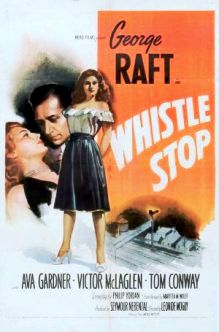Whistle Stop (1946 film)
| Whistle Stop | |
|---|---|
 Theatrical release poster | |
| Directed by | Léonide Moguy |
| Screenplay by | Philip Yordan |
| Produced by | Seymour Nebenzal |
| Starring | George Raft Ava Gardner Victor McLaglen Tom Conway |
| Cinematography | Russell Metty |
| Edited by | Gregg C. Tallas |
| Music by | Dimitri Tiomkin |
Production company | Nero Films |
| Distributed by | United Artists |
Release date |
|
Running time | 85 minutes |
| Country | United States |
| Language | English |
Whistle Stop is a 1946 crime film noir directed by Léonide Moguy and featuring starring George Raft and Ava Gardner. The screenplay is written by Philip Yordan, and based on a novel by Maritta M. Wolff. The supporting cast was headed by Victor McLaglen and Tom Conway[1]
Plot
Away for two years, a woman named Mary (Ava Gardner) returns to her home in a small town (a 'whistle stop'). She attempts to reconcile with Kenny Veech (George Raft), her former romantic interest, but he is jealous and bitter, particularly after she takes up with Veech's mortal enemy, nightclub owner Lew Lentz (Tom Conway).
Gitlo (Victor McLaglen), a friend of Kenny's who works for Lentz, talks him into a scheme to rob and kill Lentz at a train station as he leaves for Detroit, then hide his corpse to make Mary believe he chose not to return. Mary manages to foil Veech's plans, but she remains torn between the two men.
Seeking vengeance, Lentz tries to pin a murder on Veech and Gitlo, who barely make a getaway. Gitlo and Lentz end up killing one another, and Mary finds Veech recovering from a gunshot wound to the arm he had suffered while making his and Gitlo's escape. The movie ends with them arm-in-arm, walking away to live happily ever-after.
Cast
- George Raft as Kenny Veech
- Ava Gardner as Mary
- Victor McLaglen as Gitlo
- Tom Conway as Lew Lentz
- Jorja Curtright as Fran
- Jane Nigh as Josie Veech
- Florence Bates as Molly Veech
- Charles Drake as Ernie
Production
Philip Yordan bought the film rights to the 1940 novel and wrote a screenplay. He got Seymour Nebenzal to produce and remained associate producer in exchange for 50$ of the profits.[2]
The film was financed by a bank in Palm Springs.[3]
Reception
Box-office
The film was a box office hit.[3]
Critical response
When the film was released, film critic Bosley Crowther, dismissed the film, writing, "A slice of sordid life in a small mid-Western town was somewhat faithfully reflected in Maritta Wolff's novel, Whistle Stop, but the same can't be said for the picture, based upon it, which came to the Globe on Saturday. This plainly remote and artificial concoction lacks flavor, consistency, reason and even dramatic suspense. And it is also abominably acted—which covers about everything ... The film was directed by Leonide Moguy, late of France. Don't ask us why."[4]
Variety magazine, however, was more positive in their review. The staff wrote, "Heavy melodrama, adapted from the Maritta M. Wolff novel of same title, is somber melodrama, vignetting a seamy side of life in a small town. Production and playing are excellent and the direction strong, although latter is given to occasional arty tone ... Gardner displays her best work to date as the girl who must have her man. McLaglen hits top form as the not too bright bartender, and Conway is smooth as the heavy. Score is an aid in projecting the somber mood."[5]
Recently, film critic Dennis Schwartz was harsh in his review, writing, "A low-level B film on the seamy side-of-life, that revolves around a bitter love triangle. It's directed without too much skill by Leonide Moguy (Paris After Dark/Two Women/Diary of a Bad Girl) ... The wannabe film noir is dumber than dumb. The convoluted storyline has about as much going for it as the risible loser performance does by a miscast George Raft, who never looked quite as stiff as he does in this stinker. All the main characters are unsympathetic, and the plot is brainless. It's one of those somber films about the human condition that has nothing important to say about the human condition, but is unintentionally funny when it tries to be the most serious."[6]
References
Notes
- ^ Whistle Stop at the TCM Movie Database.
- ^ HOLLYWOOD WEIGHS ITS RESERVES: Gangsters Again THE HOLLYWOOD WIRE Fixing the "Whistle" Nice Place Albion in Films By FRED STANLEY. New York Times (1923-Current file) [New York, N.Y] 08 July 1945: 15.
- ^ a b Everett Aaker, The Films of George Raft, McFarland & Company, 2013 p 118
- ^ Crowther, Bosley. The New York Times, film review, March 18, 1946. Accessed: July 19, 2013.
- ^ Variety. Staff film review, 1946. Accessed: July 19, 2013.
- ^ Dennis Schwartz Dennis Schwartz. Ozus' World Movie Reviews, film review, July 21, 2010. Accessed: July 19, 2013.
Bibliography
- Franz Marksteiner: You Don't Know Mary. Whistle Stop, von Leonide Moguy (1946). In: Christian Cargnelli, Michael Omasta (eds.): Schatten. Exil. Europäische Emigranten im Film noir. PVS, Vienna 1997, ISBN 3-901196-26-9.
External links
- Whistle Stop at the AFI Catalog of Feature Films
- Whistle Stop at IMDb
- Template:Allmovie title
- Whistle Stop at the TCM Movie Database
- Whistle Stop is available for free viewing and download at the Internet Archive
- Whistle Stop complete film on YouTube (Classics movie online)
Streaming audio
- Whistle Stop on Lux Radio Theater: April 15, 1946
